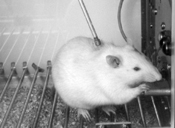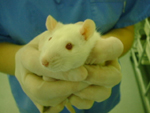

In October 2003, Florida Governor Jeb Bush announced that The Scripps Research Institute, a private biomedical research organization based in La Jolla, California, had chosen Palm Beach County as the location for its new East Coast facility. Scripps’
350,000-square-foot Florida headquarters opened in February 2009 in Jupiter (northern Palm Beach
County). Scripps Research Institute Florida is one
of the largest animal research facilities in the state, using
thousands of animals in experiments each year.
Animal
research at Scripps
|
|
|
One monkey died after receiving more than twice the approved dosage of Ecstasy. Inspectors also found that drugs used in the experiments had expired, and that living conditions for monkeys were inadequate. Scripps was forced to temporarily suspend the research in March 2004. In its 2004 annual report, Scripps reported to the USDA that five monkeys were involved in experiments producing pain and/or distress in the animals that was not alleviated by painkillers (research institutions are required to report these statistics). Unfortunately, research using monkeys and other animals to study human drug abuse continues at The Scripps Research Institute. |
|
|
Chimpanzees are an endangered species, and our closest genetic relatives. Chimpanzee intelligence, self-awareness, social behavior and emotions are well understood. Unfortunately, The Scripps Research Institute continues to use these complex animals in experiments. The Animal Rights Foundation of Florida is calling upon Scripps to commit not to participate in experiments that involve chimpanzees or other great apes. Francis Chisari. Francis Chisari, M.D., is Head of Scripps' Division of Experimental Pathology. Dr. Chisari has been at Scripps since the early 1970s, and since at least 1973 he's been infecting chimpanzees with the hepatitis B and C viruses. A 2002 study was typical of Dr. Chisari's research using chimpanzees. Six healthy chimpanzees were infected with hepatitis C. Blood samples and liver biopsies were taken on a weekly basis, and the “progress” of the virus infection was monitored. Several chimpanzees in the study developed chronic infections. Animal experiments are not necessary in studying how hepatitis C infects or affects humans. Humans and chimpanzees are very similar, yet their few differences are very important. Chimpanzees can be infected with hepatitis C, as they can with other viruses that infect humans, but chimpanzees respond to the virus differently than humans. In the development of vaccines, the use of chimpanzees and other animals has often led to misleading conclusions. Most of the approximately 1,200 chimps in U.S. labs were bred in the 1980s to be used in AIDS research. Millions of dollars was spent in the hopes of developing an AIDS vaccine before researchers concluded that chimpanzees are of little value in the search for a cure (while chimps can be infected with HIV, the virus rarely makes them ill). Sadly, the search for a hepatitis C vaccine has long languished because research has focused on chimpanzees and other animals. The United States is one of the only remaining countries to use chimpanzees in research. Many countries around the world, including Great Britain, New Zealand, Sweden, and The Netherlands, have prohibited research on great apes (chimpanzees, bonobos, gorillas and orangutans). (see “Chimps Deserve Better,” The Humane Society of the United States.) An
end to Scripps' experiments on chimpanzees? The groundbreaking cell culture system accurately replicates what the hepatitis C virus does in the liver of infected humans.“The lifecycle of the virus is now completely open to us,” said Dr. Chisari. Dr. Chisari predicted the new system would contribute to a “deeper understanding” of the hepatits C virus, and “greatly accelerate” the search for a vaccine, as well as drugs to treat people already infected. What does this mean for Scripps' use of chimpanzees? We hope that Dr. Chisari will continue his research using this promising non-animal method, and abandon the use of animals. photo: "Debbie" suffered for years in laboratories. She is now living at Save The Chimps, a sanctuary in Florida for chimpanzees rescued from the laboratory. |
|
There
is good news! Many
of Scripps' scientists are skilled at the use of sophisticated
computer modeling in studying disease, and Scripps Florida’s
research programs will include genomics (the study of an organism's
genetic makeup and the use of the genes) and other areas of scientific
research that usually do not involve the use of live animals.
This research is the way of the future, and we hope this is where
Scripps will focus its efforts. |
|
|
Although we believe all animals have the right to not be exploited as experimental subjects, we have made reasonable requests that would benefit animals in Scripps’ labs: —An
End to Research on Chimpanzees. —A
Voice for Animals on Institutional Animal Committee.
—Public
Accountability. Please send polite letters to Scripps President Richard Lerner and request that Scripps address the above issues.
You can also send a note to Dr. Lerner through Scripps' website: www.scripps.edu/contact. |
|
1431 N. Federal Highway • Fort Lauderdale, Florida 33304 • (954) 727-ARFF


 The Scripps Research Institute is the largest private research
institution in the United States. According to U.S. Department
of Agriculture (USDA) records, The Scripps Research Institute
reported using less than 250 animals—rabbits and guinea pigs—in experiments in 2010. But this number
does not include tens of thousands of mice and rats in Scripps
labs, animals who are not provided even minimal protection under
federal regulations. (Scripps does not report its use of mice
and rats to the USDA.) photo: rat in a Scripps laboratory.
The Scripps Research Institute is the largest private research
institution in the United States. According to U.S. Department
of Agriculture (USDA) records, The Scripps Research Institute
reported using less than 250 animals—rabbits and guinea pigs—in experiments in 2010. But this number
does not include tens of thousands of mice and rats in Scripps
labs, animals who are not provided even minimal protection under
federal regulations. (Scripps does not report its use of mice
and rats to the USDA.) photo: rat in a Scripps laboratory.
 Government
inspectors found that monkeys used in a study of the drug MDMA,
or "Ecstasy," were fed less than 30% of the food they
should have received. The inspectors noted that Scripps researchers
ignored the advice of its own veterinarian concerning proper nutrition
for monkeys.
Government
inspectors found that monkeys used in a study of the drug MDMA,
or "Ecstasy," were fed less than 30% of the food they
should have received. The inspectors noted that Scripps researchers
ignored the advice of its own veterinarian concerning proper nutrition
for monkeys.
 In
July 2005, a research team led by Dr. Chisari announced an exciting
development: a method of creating a hepatitis C virus infection
of cells in vitro (in an artificial environment).
In
July 2005, a research team led by Dr. Chisari announced an exciting
development: a method of creating a hepatitis C virus infection
of cells in vitro (in an artificial environment). 
